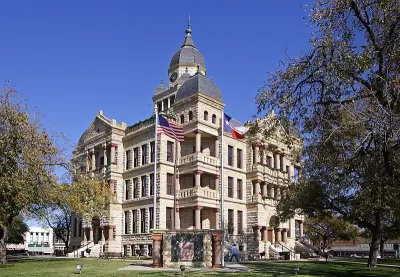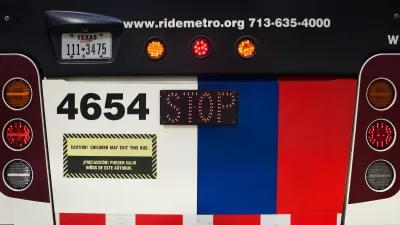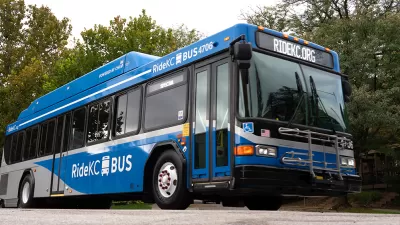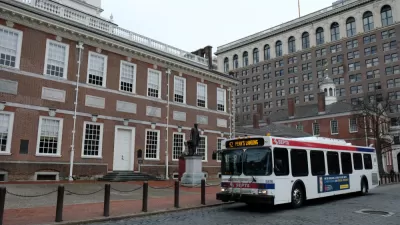Transit advocates worry that outsourcing fixed-route service will decrease service levels and raise costs for riders.

According to a blog post from TransitCenter, "[d]espite mounting evidence of the limits of microtransit, the transit agency in Denton, TX, is barrelling ahead with a plan to replace most of its fixed-route bus system with on-demand service." The "on-demand vans operated by Via are expected to replace six out of DCTA’s eight local bus routes, as well as its express bus service."
"But other experiments in microtransit – Innisfil, Ontario; Pinellas County, Florida; and Los Angeles – serve as cautionary tales. Outsourcing fixed-route transit functions to microtransit companies has not panned out well for riders or workers. Nor does it usually turn out to be the fiscal bargain it was promised to be." Unlike public transit, microtransit costs more as it scales up in size and geographic reach. If Denton goes forward with the plan, "thousands of riders’ daily mobility needs may soon hinge on a dubious business model that has performed poorly in other places. The promises of cheap fares, shorter waits, and lower costs only hold up when few people use the system and transit workers are devalued."
The blog post concludes that "[m]icrotransit is aptly named. Ridership will always remain tiny with microtransit, because the service is, by definition, preposterously expensive to scale up. And microtransit is typically tied to a business model that shrinks wages and benefits for transit workers."
FULL STORY: No Go Zone: Behind the Plan to Shrink the Bus System in Denton, Texas

Study: Maui’s Plan to Convert Vacation Rentals to Long-Term Housing Could Cause Nearly $1 Billion Economic Loss
The plan would reduce visitor accommodation by 25,% resulting in 1,900 jobs lost.

North Texas Transit Leaders Tout Benefits of TOD for Growing Region
At a summit focused on transit-oriented development, policymakers discussed how North Texas’ expanded light rail system can serve as a tool for economic growth.

Using Old Oil and Gas Wells for Green Energy Storage
Penn State researchers have found that repurposing abandoned oil and gas wells for geothermal-assisted compressed-air energy storage can boost efficiency, reduce environmental risks, and support clean energy and job transitions.

Private Donations Propel Early Restoration of Palisades Playground
Los Angeles has secured over $1.3 million in private funding to restore the Pacific Palisades playground months ahead of schedule, creating a modern, accessible space that supports community healing after recent wildfires.

From Blight to Benefit: Early Results From California’s Equitable Cleanup Program
The Equitable Community Revitalization Grant (ECRG) program is reshaping brownfield redevelopment by prioritizing projects in low-income and environmental justice communities, emphasizing equity, transparency, and community benefits.

Planting Relief: Tackling Las Vegas Heat One Tree at a Time
Nevada Plants, a Las Vegas-based nonprofit, is combating the city’s extreme urban heat by giving away trees to residents in underserved neighborhoods, promoting shade, sustainability, and community health.
Urban Design for Planners 1: Software Tools
This six-course series explores essential urban design concepts using open source software and equips planners with the tools they need to participate fully in the urban design process.
Planning for Universal Design
Learn the tools for implementing Universal Design in planning regulations.
Ascent Environmental
Borough of Carlisle
Institute for Housing and Urban Development Studies (IHS)
City of Grandview
Harvard GSD Executive Education
Toledo-Lucas County Plan Commissions
Salt Lake City
NYU Wagner Graduate School of Public Service





























